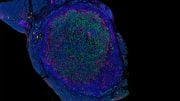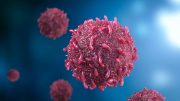
Researchers working on a personalized mRNA cancer vaccine for pancreatic ductal adenocarcinoma (PDAC), a deadly form of pancreatic cancer, used gene sequencing from tumor samples of 19 patients to create customized mRNA vaccines, targeting up to 20 neoantigens. The research indicated that in half the patients, the vaccine triggered the activation of T cells that recognized their specific pancreatic cancer. Post-treatment, cancer recurrence was not observed in patients with a strong T cell response to the vaccine, even after a year and a half.
An NIH-funded team from Memorial Sloan Kettering Cancer Center has developed a personalized mRNA cancer vaccine for pancreatic ductal adenocarcinoma (PDAC), in collaboration with BioNTech. The experimental treatment, aimed at triggering T cell activation to fight the specific cancer, showed promising results in preventing cancer recurrence among patients with a strong immune response, paving the way for a larger clinical trial.
- A personalized mRNA vaccine against pancreatic cancer created a strong anti-tumor immune response in half the participants in a small study.
- The vaccine will soon be tested in a larger clinical trial. The approach may also have potential for treating other deadly cancer types.
Pancreatic ductal adenocarcinoma (PDAC), the most common type of pancreatic cancer, is one of the deadliest cancer types. Despite modern therapies, only about 12% of people diagnosed with this cancer will be alive five years after treatment.
Immunotherapies—drugs that help the body’s immune system attack tumors—have revolutionized the treatment of many tumor types. But to date, they have proven ineffective in PDAC. Whether pancreatic cancer cells produce neoantigens—proteins that can be effectively targeted by the immune system—hasn’t been clear.
An NIH-funded research team led by Dr. Vinod Balachandran from Memorial Sloan Kettering Cancer Center (MSKCC) have been developing a personalized mRNA cancer-treatment vaccine approach. It is designed to help immune cells recognize specific neoantigens on patients’ pancreatic cancer cells. Results from a small clinical trial of their experimental treatment were published on May 10, 2023, in Nature.
After surgery to remove PDAC, the team sent tumor samples from 19 people to partners at BioNTech, the company that produced one of the COVID-19 mRNA vaccines. BioNTech performed gene sequencing on the tumors to find proteins that might trigger an immune response. They then used that information to create a personalized mRNA vaccine for each patient. Each vaccine targeted up to 20 neoantigens.
Customized vaccines were successfully created for 18 of the 19 study participants. The process, from surgery to delivery of the first dose of the vaccine, took an average of about nine weeks.
All patients received a drug called atezolizumab before vaccination. This drug, called an immune checkpoint inhibitor, prevents cancer cells from suppressing the immune system. The vaccine was then given in nine doses over several months. After the first eight doses, study participants also started standard chemotherapy drugs for PDAC, followed by a ninth booster dose.
Sixteen volunteers stayed healthy enough to receive at least some of the vaccine doses. In half these patients, the vaccines activated powerful immune cells, called T cells, that could recognize the pancreatic cancer specific to the patient. To track the T cells made after vaccination, the research team developed a novel computational strategy with the lab of Dr. Benjamin Greenbaum at MSKCC. Their analysis showed that T cells that recognized the neoantigens were not found in the blood before vaccination. Among the eight patients with strong immune responses, half had T cells target more than one vaccine neoantigen.
By a year and a half after treatment, the cancer had not returned in any of the people who had a strong T cell response to the vaccine. In contrast, among those whose immune systems didn’t respond to the vaccine, the cancer recurred within an average of just over a year. In one patient with a strong response, T cells produced by the vaccine even appeared to eliminate a small tumor that had spread to the liver. These results suggest that the T cells activated by the vaccines kept the pancreatic cancers in check.
“It’s exciting to see that a personalized vaccine could enlist the immune system to fight pancreatic cancer—which urgently needs better treatments,” Balachandran says. “It’s also motivating as we may be able to use such personalized vaccines to treat other deadly cancers.”
More work is needed to understand why half the people did not have a strong immune response to their personalized vaccines. The researchers are currently planning to launch a larger clinical trial of the vaccine.
Reference: “Personalized RNA neoantigen vaccines stimulate T cells in pancreatic cancer” by Luis A. Rojas, Zachary Sethna, Kevin C. Soares, Cristina Olcese, Nan Pang, Erin Patterson, Jayon Lihm, Nicholas Ceglia, Pablo Guasp, Alexander Chu, Rebecca Yu, Adrienne Kaya Chandra, Theresa Waters, Jennifer Ruan, Masataka Amisaki, Abderezak Zebboudj, Zagaa Odgerel, George Payne, Evelyna Derhovanessian, Felicitas Müller, Ina Rhee, Mahesh Yadav, Anton Dobrin, Michel Sadelain, Marta Łuksza, Noah Cohen, Laura Tang, Olca Basturk, Mithat Gönen, Seth Katz, Richard Kinh Do, Andrew S. Epstein, Parisa Momtaz, Wungki Park, Ryan Sugarman, Anna M. Varghese, Elizabeth Won, Avni Desai, Alice C. Wei, Michael I. D’Angelica, T. Peter Kingham, Ira Mellman, Taha Merghoub, Jedd D. Wolchok, Ugur Sahin, Özlem Türeci, Benjamin D. Greenbaum, William R. Jarnagin, Jeffrey Drebin, Eileen M. O’Reilly and Vinod P. Balachandran, 10 May 2023, Nature.
DOI: 10.1038/s41586-023-06063-y









Very interesting.
Cancer is cell growth gone Awry.
The human ecosystems Immune Response determines its ability to fight off invaders attacking it’s regulation.Such response is individual and hence immune regulation also needs to personalised.
Multiple Sclerosis ( MS ) is a debilitating Health Condition.
It normally requires immunosuppressants to treat and control.
Set a thief to catch a thief.
All the best in Humanity ‘s Moonshot efforts driven bby the tragic death of your Beau , Joe and Jill.
God Bless you 🙏🙏🙏.
Lovely comment…